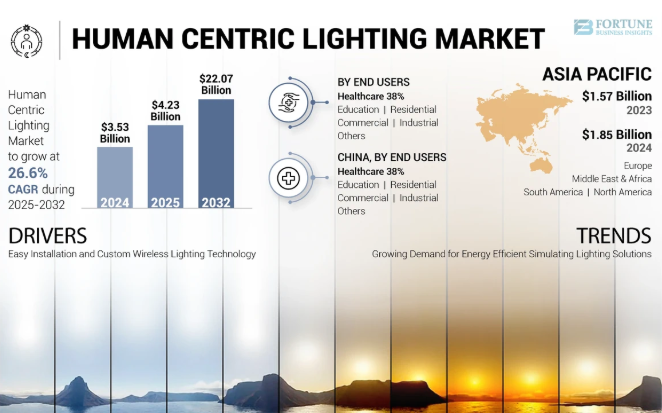Human Centric Lighting Market Key Drivers, Restraints, Industry Size & Share, Opportunities, Trends, and Forecasts up
 Vedika Patil
Vedika PatilGlobal Human Centric Lighting Market Overview
The global human centric lighting (HCL) market size was valued at USD 3.53 billion in 2024 and is projected to grow from USD 4.23 billion in 2025 to USD 22.07 billion by 2032, exhibiting a CAGR of 26.6% during the forecast period.
Human centric lighting (HCL) is designed to support human health, well-being, and performance by simulating natural daylight patterns. It enhances circadian rhythm regulation, productivity, mood, and sleep quality, making it increasingly popular across workplaces, healthcare facilities, educational institutions, and residential spaces.
Key Market Players
Signify Holding (Philips Lighting)
OSRAM Licht AG
Acuity Brands, Inc.
Zumtobel Group AG
Hubbell Incorporated
Lutron Electronics Co., Inc.
Glamox AS
Fagerhult Group
Legrand S.A.
Wipro Lighting
Request Sample PDF: https://www.fortunebusinessinsights.com/enquiry/request-sample-pdf/human-centric-lighting-market-108854
Market Drivers
Growing Focus on Employee Productivity and Well-being
Organizations are investing in HCL solutions to improve workplace comfort, boost employee alertness, and reduce fatigue.Increasing Adoption in Healthcare and Elderly Care Facilities
Hospitals and senior care centers are implementing HCL to support patient recovery, improve sleep cycles, and promote mental health.Rising Smart Building and Smart Home Deployments
Integration of HCL into smart lighting systems is accelerating, supported by IoT, automation, and energy-efficient technologies.Supportive Government Initiatives for Energy Efficiency
Regulations promoting energy-efficient lighting systems are boosting demand for advanced HCL solutions worldwide.
Market Restraints
High Initial Installation Costs
Despite long-term benefits, the upfront cost of HCL systems remains a barrier, particularly for small-scale users.Limited Awareness Among End Users
Many consumers and enterprises are still unaware of the health and performance benefits of HCL, slowing adoption.Integration Challenges with Legacy Lighting Infrastructure
Upgrading traditional lighting systems to HCL requires significant retrofitting and customization, creating adoption hurdles.
Opportunities
Expansion in Commercial and Corporate Workspaces
The shift towards employee-centric office design is creating strong growth opportunities for HCL providers.Integration with IoT, AI, and Smart Controls
Advanced sensors and AI-driven lighting control systems allow personalization, enhancing the user experience.Adoption in Educational Institutions
Schools and universities are adopting HCL to improve student concentration, learning outcomes, and classroom comfort.Rising Demand from Emerging Markets
Rapid urbanization and rising disposable income in Asia-Pacific and Latin America are driving new market opportunities.
Regional Insights
North America
- Expected to lead adoption due to strong awareness of workplace wellness, early adoption of smart building technologies, and presence of key players.
Europe
- Growth supported by energy-efficiency regulations, widespread adoption of sustainable building practices, and investments in healthcare and education infrastructure.
Asia-Pacific
- Forecast to witness the fastest growth, fueled by urbanization, expanding corporate spaces, and government initiatives promoting green buildings in countries like China, India, and Japan.
Speak To Analysts:https://www.fortunebusinessinsights.com/enquiry/speak-to-analyst/human-centric-lighting-market-108854
Market Segmentation
By Application
Workplace & Office
Healthcare & Elderly Care
Education & Research
Residential
Industrial
By Installation Type
New Installations
Retrofit Installations
By Offering
Hardware (LED Modules, Controllers, Sensors)
Software & Services
Conclusion
The human centric lighting market is set to expand rapidly, driven by workplace wellness initiatives, smart building growth, and increasing applications in healthcare and education. While high costs and limited awareness remain challenges, the integration of IoT and AI technologies along with strong demand from emerging markets will create significant opportunities.
Subscribe to my newsletter
Read articles from Vedika Patil directly inside your inbox. Subscribe to the newsletter, and don't miss out.
Written by

